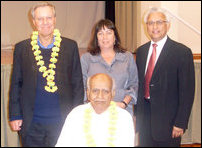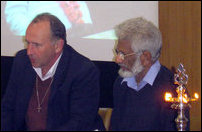TGTE member from New Zealand speaks on Vaddukkoaddai Resolution
[TamilNet, Monday, 10 May 2010, 00:13 GMT]
Mr. S.J.V. Chelvanayakam, in his last ever speech in the Sri Lankan parliament on 19 November 1976 said: “Our Party is moving with the idea of establishing a separate state. It is not an easy matter to get a separate State; it is a difficult matter. We know it is difficult. But either we get out of the power of the Sinhala masses or we perish. That is certain. Therefore, we will try and get this separation.” Citing the speech Mr. A. Theva Rajan, member of the Transnational Government of Tamil Eelam, from New Zealand, said that the relevance of Vaddukkoaddai Resolution today is unique in historical terms as "the reign of Percival Rajapakse" fully demonstrated to the world that the Tamils are facing a genocidal onslaught. "Rajapakse brothers made the Tamil genocide open, indelible and internationally recorded,” he said.

Mr. A. Theva Rajan with New Zealand parliamentarians [L-R] Mr. Keith Locke, MP (Green Party Leader), Ms. Carol Bemaunt, MP Labour Party and Mr. Rajen Prasad MP (Labour Party) during the announcement by the TGTE election commission in Auckland.

Professor K.S.Naguleswaran (Kailasapillai Sivapatham Naguleswaran) [right] representing Wellington for TGTE. Seen with him is Fr. G. Burns.
According to Mr. Theva Rajan, in the 1977 general election the entire country voted on the Vaddukkoaddai Resolution and not just the Tamils. Because, responding to the TULF manifesto based on the VR, even the United National Party made promises of redress. But after coming to power getting 5 / 6 majority with Tamil, Muslim, Malay and Burger support, the Sinhala leadership enacted only ethnic pogroms on Tamils, Theva Rajan said.
Mr Theva Rajan and Prof. K.S. Naguleswaran were elected uncontested from New Zealand for the TGTE, representing the constituencies Auckland and Wellington respectively.
Coming from Puloali West in Jaffna, Theva Rajan, 76 years old, is a scholar in his own right contributed to Tamil studies for more than half a century. He retired early from public service to become a trade unionist and freelance journalist in Tamil and English.
Theva Rajan was one of the first to study the Brahmi inscriptions of Sri Lanka, bringing out the Tamil personal names and the other Dravidian elements in them to the attention of scholars in India and Sri Lanka. In the early 1970s, associated with the Jaffna Archaeological Society, he brought to light a megalithic urn burial in Vallipuram. His research presentations and publications were on wide-ranging topics: Murukan cult among the Sinhalese, Tamil language rights in Sri Lanka, public servants and legal remedies, human rights, children’s literature and many others.
Since 1960s Theva Rajan was associated with the organization of a number of societies such as the committee for the installation of the statue of Arumuga Navalar in 1969, society remembering a Tamil scholar Sathaavathaanam Kathiraivet Pillai and Fr. Thaninayagam Foundation.
Settled in New Zealand in the late 1990s, he is active in working on human rights and on cultural affairs of the diaspora, caring especially the third generation.
Professor K S Naguleswaran, born in Kantharmadam in Jaffna is an old student of Jaffna Hindu College. After graduating from the University of Ceylon, he did his doctoral studies at the University of Birmingham. Now retired after serving as an Associate Professor in Mechanical Engineering at the University of Canterbury, Professor Naguleswaran has told media that it was his early experience of the 1958 pogrom that made him to realise the importance of Human Rights, good governance and democracy.
Following is the full text of an article written by A. Theva Rajan:
HISTORICAL UNIQUENESS OF THE VADDUKKODDAI RESOLUTIONThe Vddukkoddai Resolution of 14 May 1976 consists of 13 preambles tracing aspects of the history of the Tamils and their political agitations and experiences.
Preamble 5 is more marked in that it identifies specific areas of deprivals and oppression of the Tamils.
Of these 5(e) is very important in that it embodies the fundamental rights deprived to the Tamils. It says:
“denying to the Tamils equality of opportunity in the spheres of employment, education, land alienation and
economic life in general and starving Tamil areas of large scale industries and development schemes thereby seriously endangering their very existence in Ceylon.”
5 (g) deals with state terrorism against Tamil public and 5 (h) deals with state terrorism against Tamil youth.
Emphasizing that the democratic rights of Tamils are being
trampled the resolution adds:
“this convention resolves that restoration and reconstitution of the free, sovereign, secular, socialist State of Tamil Eelam, based on the right of self determination inherent to every nation, has become inevitable in order to safeguard the very existence of the Tamil Nation in this country.”
In the General Election that ensued in 1977 the Tamil United Liberation Front made the Vaddukkoddai resolution as the basis of their Manifesto. Ten (10) items under the sub title, The Tamil Nation Under Sinhala Domination, outlines in detail the alienation of Tamils, in their fundamental rights and participatory democracy. The TULF called for a mandate from the Tamil people to carry forward their agenda. The TULF said it:
“.. seeks in the General Election the mandate of the Tamil Nation to establish an independent sovereign, secular, socialist State of Tamil Eelam that includes all the geographically contiguous areas that have been the traditional homeland of the Tamil speaking people in the country.”
The Tamils mandated the Vaddukkoddai resolution at the 1977 General Election with over 75% support. Incidentally, the United National Party in its Election Manifesto for the same elections sought the support of the entire Nation
for a mandate to rectify the grievances of the Tamils. The
UNP Manifesto said :
“…(that) the United National Party accepts the position that there are numerous problems confronting the Tamil-speaking people. The lack of a solution to their problems had made the Tamil-speaking people support even a movement for the creation of a separate State. In the interest of national integration and unity so necessary for the economic development of the whole country, the Party feels
such problems should be solved without loss of time. The Party, when it comes to power, will take all possible steps to remedy their grievances in such fields as –
1) Education : (2) Colonization.(3) Use of the Tamil language : (4) Employment in the Public and Semi Public
Corporations.”
The people, Sinhalese, Tamils, Muslims, Malays and Burghers voted overwhelmingly for the Party and the UNP secured 5/6th majority in Parliament while the TULF was privileged to be the main opposition Party securing the position of the Leader of the Opposition to its leader.
It has to be underlined here that the entire country voted on the Vaddukkoddai resolution mandating the immediate redress for the Tamil grievances.
Events that followed reaffirmed that the mention about Tamil grievances was only like shedding crocodile tears - the usual trump card to secure Tamil votes at the Elections.
Soon afterwards, in August 1978,J.R. Jayawardene, the Prime
Minister then, thundered in Parliament “ If you want war let there be war; if you want peace let there be peace.”
It is a repetition of the history of Sinhala leadership.
Even begging for support to entrench them in power and then to cut under the feet of the Tamils. This is the unaltered long dark history of Sinhala politicians. The 1977 and 1983 State oriented pogroms are indelible chapters in the bloody history of Sinhala political leadership.
All that happened under Presidents Jayawardene, Premadasa and Chandrika are dark pages of the history of Sri Lanka’s racist politics.
The reign of Percival Rajapakse fully demonstrated to the world that the Tamils are facing a genocidal onslaught.
Rajapakse brothers made the Tamil genocide open, indelible and internationally recorded.
The late Mr.S.J.V. Chelvanayakam, the internationally revered leader of the Tamils in his last ever speech in Parliament made on 19 November 1976 left this message to the Sinhalese, the Tamils and the Nation and the international community in unambiguous terms.
“Our Party is moving with the idea of establishing a separate state. It is not an easy matter to get a separate State; it is a difficult matter. We know it is difficult. But either we get out of the power of the Sinhala masses or we perish. That is certain. Therefore, we will try and get this separation.” (Parliament Hansard Vol. 1977, column 1965 – 19 November 1976)
In the background of all these developments there can be no doubt that the Vaddukkoddai resolution is unique in historical terms.
Chronology:








